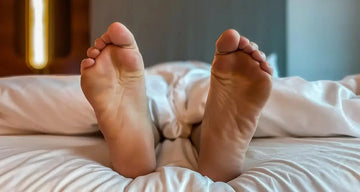Cold sweaty feet can cause discomfort and embarrassment, and even lead to symptoms such as smelly feet and infections. Understanding the causes of cold, sweaty feet and the measures to address them is crucial for people with sweaty feet.
Reasons for Cold Sweaty Feet
There are various reasons for cold and sweaty feet, which we have categorized into the following three:
Genetic Factors
Studies have shown that if you have a family member with hyperhidrosis, you are much more likely to suffer from it. Some people are born with more active sweat glands, which often results in cold, sweaty feet, even in weather with comfortable temperatures.
Physical Conditions
In fact, people with hyperthyroidism and diabetes are more prone to cold feet and sweating. These people tend to have dysregulation of the autonomic nervous system, which affects blood circulation and sweat gland secretion, resulting in cold and sweaty feet. Clinicians recommend diabetic socks and alpaca socks for these two types of individuals, which can dramatically increase the effectiveness of treatment.
External Environment
High-intensity exercise increases body temperature, which causes sweat glands to secrete large amounts of sweat to lower the temperature. As a result, people who regularly engage in strenuous physical activity may find their feet damp and cold. In addition, cold weather significantly increases the likelihood of cold, sweaty feet.
How to Prevent
Prevention is always more important than cure. We can't change the genetic factors in our body, but appropriate changes in lifestyle and the way we wear our shoes and socks can effectively alleviate cold and sweaty feet.
Choose socks that are breathable, absorb moisture and have a strong sweat-absorbent property, and avoid wearing them too tightly to avoid affecting blood circulation. For socks, wool and alpaca socks have good breathability and warmth, which can effectively relieve cold and sweaty feet.
Keep your feet clean. Changing socks and washing your feet regularly can significantly prevent cold, sweaty feet. It is recommended to soak your feet in lukewarm water that is slightly higher than your body temperature, massage your feet properly to promote blood circulation, and dry your feet after washing to keep them dry.
Regular and moderate exercise can enhance your immunity and improve blood circulation throughout the body, which can significantly alleviate cold and sweaty feet. Daily diet should be light, less consumption of stimulating beverages, avoid staying up late to help stabilize the nervous system.

The Best Way to Treat Sweaty Feet
For those with less severe symptoms of sweaty feet, purchasing shoes and socks that are moisture-wicking and breathable can be of great help. Choosing materials such as wool, bamboo fiber or alpaca wool can effectively wick away sweat from the surface of the skin and keep your feet dry. Alpaca socks in particular also have an antibacterial effect and excellent warmth, preventing sweaty odors and keeping feet consistently warm.
For those whose sweaty feet symptoms have become a serious disruption to their lives, prescription-level antiperspirants or topical treatments such as gels containing gronethium bromide and oxybutynin may be required, although these medications need to be used under medical supervision. If medications fail to provide relief, surgery for sympathectomy is usually the last resort.
The Best Socks for Sweaty Feet
As an everyday item that comes into direct contact with your feet, choosing the right pair of socks that are comfortable is crucial. Alpaca wool socks are naturally warm and breathable, making them the best socks for sweaty feet. In addition, alpaca wool has natural antibacterial and deodorizing properties, is soft and comfortable to the touch, and is non-allergenic, making it ideal for diabetics and people with sweaty, cold feet.

FAQs
1.Are sweaty feet a sign of physical illness?
Not necessarily. If you are born with active sweat glands, you don't need to worry too much if it doesn't affect your normal life. However, if the symptoms of foot sweating worsen and are accompanied by pain, skin infections and other complications, it may be caused by a health problem such as thyroid or diabetes, and prompt medical attention is recommended.
2. What should I do if there is no improvement after taking preventive and curative measures?
If there is no improvement after adjusting your lifestyle and common treatment methods, it is recommended to consult a professional podiatrist for further examination and to develop a professional treatment plan.
3. Why are my feet cold and sweaty in bed?
There are many possibilities. It may be caused by the ambient temperature or bedding that is not breathable and warm enough. It may be due to poor blood circulation that causes cold and sweaty feet. It is recommended to use breathable bedding and to maintain a comfortable sleeping room temperature.
4. Can sweaty feet cause athlete's foot?
Sweaty feet can cause athlete's foot. Excessive foot sweat provides an ideal warm and moist environment for fungal growth. Therefore, wearing breathable shoes and socks and keeping your feet dry and fresh are effective in preventing tinea pedis.
To Summarize
Cold and sweaty feet can be significantly relieved by understanding the causes, taking effective preventative measures, choosing the right treatment options, and wearing breathable socks.
We hope the information provided in this article has helped you manage your cold, sweaty feet, and if you have any further questions, please contact us, the Clohill professional team is here to help.









